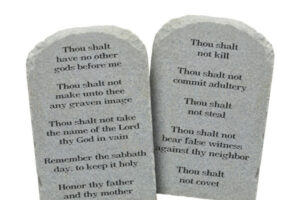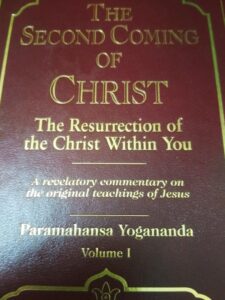“Did God really say”? (Genesis 3:1)
This was how we ended our previous article on the subject. According to the Bible, these words were spoken by the devil or Satan coming in the form of a serpent. Time and again, the Bible describes satanic activity, for instance – in seeking permission from God to plague Job (a), in attempting to sabotage Jesus’s mission on earth by tempting him (b), in lying wait to swallow the faith of those who would believe in Jesus (c) and so forth. Let me quote the relevant verses:
(a)“Skin for skin!” Satan replied. “A man will give all he has for his own life. 5 But now stretch out your hand and strike his flesh and bones, and he will surely curse you to your face.”
6 The Lord said to Satan, “Very well, then, he is in your hands; but you must spare his life.” (Job 2:4-6)
(b)”The tempter came to him and said, “If you are the Son of God, tell these stones to become bread.”” (Matthew 4:3)
(c)”Be alert and of sober mind. Your enemy the devil prowls around like a roaring lion looking for someone to devour.” (1 Pet. 5:8)
We have been looking at areas where the harmony which PY is trying to establish between Christian teaching and the Hindu vedic religion breaks down. And this domain of Satan as a teaching, is absent in Hinduism (though the name Shaitan exists). It will be interesting to see how PY deals with it further in his work, as he expounds Christianity, which is not shy at all to talk about the devil and his schemes !
Now, back to the various avatars!
PY writes and I quote: “Before the advent of Jesus, sage Vyasa, writer of Bhagwat Gita was the son of God, one with the only begotten reflection of God, the Kutashtha Chaitanya or Christ consciousness. So also Swami Shankara, Mahavatar Babaji, Lahiri Mahasaya, Swami Sri Yukteswar, and others having Christ Consciousness became there by sons of God. The Spirit could not be partial in creating Jesus as a Christ and all others as spiritually ineffectual mortal beings. Divinely imported Jesuses could be made by the thousands by God; and they would, being predestined, naturally behave on earth as Christs – spiritual puppets of God. Such Christs could hardly be the ideal of mortals struggling with all their frailties. But when there is one who became a Christ by self effort to conquer temptations and by proper use of God-given free choice and power of God-communion through intense worship or a scientific technique of meditation then that example stirs hope of salvation in the frail, timorous, matter-tortured human breast.”
Let me juxtapose extracts from the Apostles Creed and the Nicene Creed, two condensed statements of faith of believing Christians:
The Apostles Creed
“I believe in God the Father Almighty, Maker of heaven and earth.
And in Jesus Christ, His only Son, our Lord “……..
The Nicene Creed
“I believe in one God, the Father almighty, maker of heaven and earth and of all things visible and invisible. And in one Lord Jesus Christ, the only-begotten Son of God, begotten of the Father before all ages, God
of God, Light of Light, very God of very God, begotten not made, being of one substance with the Father, through Whom all things were made: Who for us men and for our salvation came down from heaven, was incarnate by the Holy Spirit of the virgin Mary, and was made man”………
It is readily apparent that the Creed is quite at variance with PY’s statement which (to quote it again) says “others having Christ consciousness became there by sons of God. The Spirit could not be partial in creating Jesus as a Christ and all others as spiritually ineffectual mortal beings. Divinely imported Jesuses could be made by the thousands by God…”
Here in effect is another statement from PY (I am quoting him again) saying sage Vyasa, writer of Bhagwat Gita …. Swami Shankara, Mahavatar Babaji, Lahiri Mahasaya, Swami Sri Yukteswar, and others…all had Christ Consciousness.
Condensing further – I hope you can stomach this – sage Vyasa, writer of Bhagwat Gita …. had Christ Consciousness (please remember that I am quoting Paramahansa Yogananda!)
Really!!! OMG this is quite extraordinary!
I do not know if Swami Parthasarathy, his daughter Sunanda and others who regularly lecture on Bhagwat Gita would accept the statement that sage Vyasa had Christ consciousness.
Can somebody familiar with their position, throw light please?
One can also quarrel with another statement of PY’s quoted above which juxtaposes the phrase “Christ by self effort to conquer temptations” and “power of God-communion through intense worship”. Surely there is an oxymoron hiding there in plain sight!
I find it also somewhat strange that PY should speak of (quoting him) “a scientific technique of meditation ….. stirring hope of salvation in the frail, timorous, matter-tortured human breast” whereas the biblical position articulated in the Nicene creed is that:
(Quote)
For us and for our salvation
he (Christ) came down from heaven;
he became incarnate by the Holy Spirit and the virgin Mary,
and was made human.
He was crucified for us under Pontius Pilate;
he suffered and was buried.
The third day he rose again, according to the Scriptures.
(Unquote)
Can a mere “scientific technique of meditation” deliver salvation (as PY claims) when it is only to be found by repentance, renouncement of sin and faith in the efficacy of the blood of Christ shed vicariously on the cross for removal of a feeling of guilt?
It is also important to note that Acts 4:12 says “Salvation is found in no one else, for there is no other name (other than Jesus) under heaven given to mankind by which we must be saved.”
I guess that puts paid to all the various avatars.
Talking about “scientific technique of meditation”, elsewhere in PY’s book there is a footnote that says, “that Jesus knew and taught yoga science of meditation to his close disciples may be deduced from the highly metaphorical Revelation of St.John and other Gospel references as will be noted in the various discourses”.
I know not any, but we will wait.
There is another statement of PY’s at the very beginning of Discourse 1 that is easily overlooked (quoting): The eternal, omnipresent,unchanging spirit (God) has neither a corporeal nor heavenly form called God.
And PY fairly raphsodizes on this subject (and I quote): “When no goblin nebulae breathed and glided in the space body,when no fire-eyed baby planets opened their eyes in the cradle of space, when no star rivers ran across the tracks of infinite space,when the ocean of space was unpeopled, uninhabited by floating island universes, when the sun and moon and planetary families did not swim in space, when the little ball of earth with its doll houses and diminutive human beings did not exist, when no object of any kind had come into being – Spirit existed.
Wow! What bewitching language!!
PY’s conviction accords very well with the Bible of course. “God is a Spirit: and they that worship him must worship him in spirit and in truth.“(John 4:24).
But how do we reconcile PY’s own understanding of God (which stems from the Bible) as a Spirit to the idolatry rampant in India – a feature of Hinduism with which PY is trying to find harmony?
Right in the early days of the Exodus story, God is categorical about the no – no of idolization of Himself:

This command along with the others was frequently transgressed by the successive generation of Israelites as they mixed with the Cananites in the Promised Land. And God sent wave after wave of prophets to set the matter right. Among them, Isaiah was pretty severe on the practice of idolatry. Listen to him as he fulminates in his book chapter 44:
“The craftsman of iron shapes a cutting tool and does his work over the coals, [a]fashioning it with hammers and working it with his strong arm. He also gets hungry and [b]his strength fails; he drinks no water and becomes weary. 13 The craftsman of wood extends a measuring line; he outlines it with a marker. He works it with carving knives and outlines it with a compass, and makes it like the form of a man, like the beauty of mankind, so that it may sit in a house. 14 He will cut cedars for himself, and he takes a holm-oak or another oak and lets it grow strong for himself among the trees of the forest. He plants a laurel tree, and the rain makes it grow. 15 Then it becomes something for a person to burn, so he takes one of them and gets warm; he also makes a fire and bakes bread. He also makes a god and worships it; he makes it a carved image and bows down before it. 16 Half of it he burns in the fire; over this half he eats meat, he roasts a roast, and is satisfied. He also warms himself and says, “Aha! I am warm, I have seen the fire.” 17 Yet the rest of it he makes into a god, his carved image. He bows down before it and worships; he also prays to it and says, “Save me, for you are my god.”
“18 They do not know, nor do they understand, for He has smeared over their eyes so that they cannot see, and their hearts so that they cannot comprehend. 19 No one [c]remembers, nor is there knowledge or understanding to say, “I have burned half of it in the fire and also have baked bread over its coals. I roast meat and eat it. Then [d]I make the rest of it into an abomination, [e]I bow down before a block of wood!”
If you found that New American Standard version hard to swallow, try this in Tamil:
கல்லதைச் செம்பை வெள்ளியைப் பொன்னைக்
கடவுளென் றடிதொழ மாட்டேன்
களிமண்ணால் மிதியிட் டுருவெனக் குயவன்
காட்டிய கோலமுங் கருதேன்
வல்லிரும் புருக்கால் வெண்கலத் தகட்டால்
மற்றுள பஞ்சலோ கத்தால்
வார்த்ததும் அடித்து வைத்தது மான
வன்சிலை களையெலா மதியேன்
செல்லரிக் காத மரத்தினைத் தெரிந்து
சித்திர வேலைக டீர்ந்த
சிறந்தபொம் மைகள்பற் பலபடங் களையுஞ்
சிந்தையிற் கனவிலு நினையேன்
எல்லையில் லாவெவ்வி தங்களா யினமும்
இருத்திய சுருபங்க ளனைத்தும்
எனக்கினி யாகா துனக்கியான் அடிமை
எந்தையே யேசுநா யகனே
வானமும் புவியும் அனைத்தையும் படைத்த
மட்டிலாச் சருவவல் லபத்தின்
மகத்துவ தேவன் செகத்தினி லீனர்
வகுத்தமே னியில்இருப் பானோ
தானதா யிருந்தோன் ஒருவனோ ரண்டோ
சாற்றுவீர் சாத்திரி மாரே
சத்தியந் தப்பி அவரவர்க் கேற்ற
சாமிகள் செய்யவுந் தகுமோ
ஞானமுள் ளவர்கள் இல்லையோ நீதி
நடுவிலாத் தேசமோ கோகோ
நம்முட கையாற் சமைத்தவிக் கிரகம்
நமக்குநற் பதவியைத் தருமோ
ஏனிதைச் செய்தீர் பாதக மலவோ
இடர்வரும் பதனமென் றுரைக்க
என்றனை யிகழ்ந்தார் உன்றனை யடைந்தேன்
இரட்சியும் யேசுநா யகனே
that was the lament of Christian poet Vedanayagam Sastriar whose ancestry was pickled in Hinduism.
It should be obvious by now that there are innumerable difficulties in “uniting the teachings of Jesus Christ and India’s ancient science of religion” in order to arrive at the “oneness of eternal truth” – PY’s mission according to the Dedication Page of this tremendous work.
Though we applaud PY’s nobility of thought (and that of his gurus), the harmony they are so intent on pursuing simply does not exist. While it may sound unprejudiced, unbigoted, unbiased, tolerant , reasonable, rational, magnanimous, high-minded, broad-minded, catholic, enlightened, advanced, avant-garde and pluralistic to hold that “all roads lead to Rome”, do all these adjectives make the statement necessarily true?
Think about it
_________________________________________



